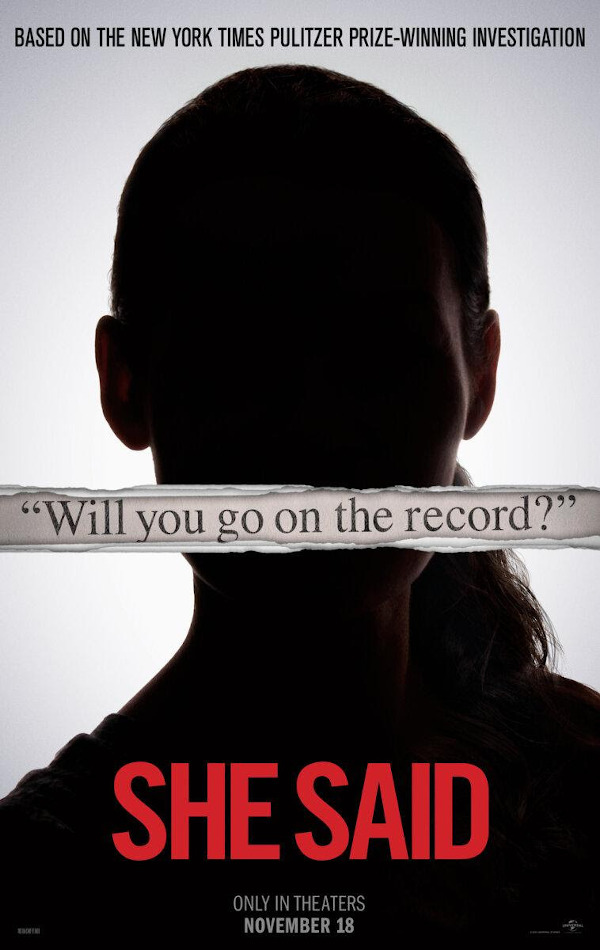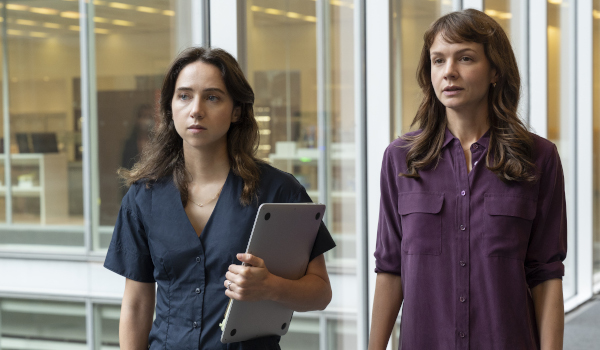- Title: She Said
- IMDb: link

 Carey Mulligan and Zoe Kazan star as New York Times reporters Megan Twohey and Jodi Kantor on the scent of a story centering around movie producer Harvey Weinstein‘s sexual and emotional abuse towards women his company, and Hollywood at large, were to willing to ignore and cover up for 25 years.
Carey Mulligan and Zoe Kazan star as New York Times reporters Megan Twohey and Jodi Kantor on the scent of a story centering around movie producer Harvey Weinstein‘s sexual and emotional abuse towards women his company, and Hollywood at large, were to willing to ignore and cover up for 25 years.
The low-key approach to many of the reporter’s interviews, from knocking on doors to waiting outside houses of those they know have stories to tell, offers the movie a bit of a timeless quality in a reporter’s search for the truth. Adapted from Twohey and Kantor’s book, the screenplay by Rebecca Lenkiewicz focuses largely on the investigation into Weinstein, while offering us glimpses into the lives of both reporters and how the breadth of what they found shook each of them. The publication of the article would eventually uncover over 100 women who had been harassed, assaulted, or raped by Weinstein.
The film is built on the performances of Kazan and Mulligan, who are up the challenge. I especially enjoyed Kazan who gets the juicier role as the less experienced and more open of the two women, wearing her heart on her sleeve with the delicate connections she’s able to make not with threats or pleading but simply by listening for the story she knows is there and offering her help. Also standouts are the far smaller roles of women (including Samantha Morton, Ashley Chiu, and Jennifer Ehle) willing to come forward to share their stories, sometimes simply described and at other times shot in flashbacks.
There are also several smart choices director Maria Schrader makes about Weinstein including casting Mike Houston as a stand-in for the character, always shot from the back or the side but never fully framed, and as a voice actor whose rants are often heard over a conference call. And the script knows when to pull back and just allowing Weinstein’s own words (such as in recordings of his misdeeds) speak for themselves without a need for dramatization. The effect of these choices, while casting actress to play the roles of many of Weinstein’s victims gives voice to the women while at the same time offering as little of the stage as possible to their tormentor and attacker (and, as a result, is far more effective than 2019’s Bombshell).
Because she’s the only actress to appear as herself, the casting of Ashley Judd, one of the few women willing to go on the record for the initial story, feels a bit off. While I can certainly understand why the likes of Rose McGowan and Gwyneth Paltrow (who we get voice stand-ins for), among others, wouldn’t want to poke at old wounds, Judd being the only one playing herself feels a bit surreal, and slightly undercut the other performances, rather than helping to bolster the overall narrative. It’s one of the few missteps for the film that otherwise allows the individual stories uncovered by the two reporters, and the tension in waiting for proof, to build naturally to the climax of confronting Weinstein and publishing of the story.
Watch the trailer


